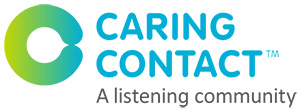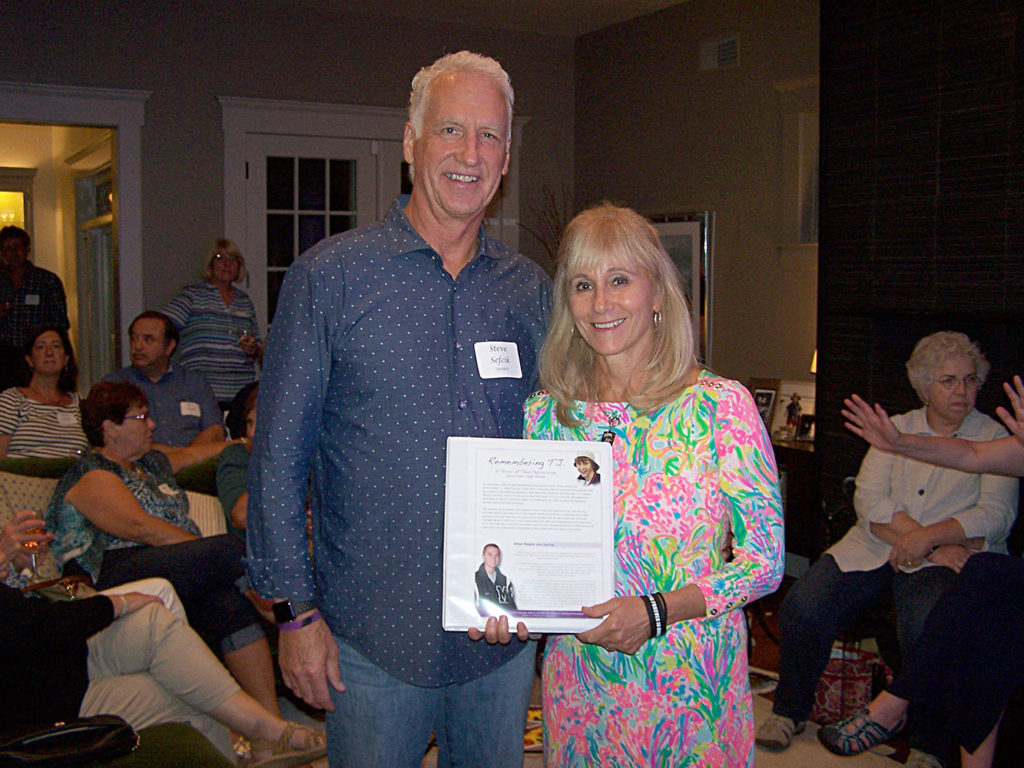
Wendy and Steve Sefcik recently shared the story of their 16 year-old son’s struggle with depression and ultimate suicide at a community gathering in Westfield sponsored by crisis listening line Caring Contact and hosted by Westfield residents Linda Habgood and Gary Zanfagna in their home.
In the evening’s program, “Breaking the Silence: Remembering T.J. – A Story of Depression, Lessons and Hope,” the Sefciks discussed the warning signs that preceded their son’s death in 2010.
They told the audience of more than 100 how their son grew up as an outgoing, sensitive boy who was well liked and excelled at sports. Yet as T.J. Sefcik moved into his teen years, he began to show what his parents now recognize as the early signs of depression, including increasing irritation and disrespect. Twice they sought guidance from counselors and both times were told T.J. was experiencing normal emotional growing pains before he was finally diagnosed with depression.
On December 1, 2010, T.J. Sefcik died by suicide. Following his death, the Sefciks immersed themselves in learning everything they could about teenage depression and suicide.
“It begs the question, ‘What would lead a boy like this to take his own life?’,” Steve Sefcik said.
“We feel it’s so imperative we share what we learned so no other family loses a child to suicide,” Wendy Sefcik added.
The Sefciks told the audience that one in four Americans will experience a diagnosable mental disorder and that one in eight teenagers will suffer at least one episode of depression before they reach adulthood. They identified symptoms of teenage depression as irritable or angry moods, unexplained aches and pains, extra sensitivity to criticism and withdrawal from some but not all people. They also warned that the stigma of suffering from depression is the greatest barrier to treatment.
The Sefciks provided the audience with a list of resources families can turn to for help with teenage depression, including Erika’s Lighthouse (erikaslighthouse.org); JED Foundation (jedfoundation.org); the Balanced Mind Parent Network (dbsalliance.org); the Society for Prevention of Teenage Suicide (sptsusa.org); and Caring Contact (caringcontact.org). A complete list can be found at rememberingtj.org.
“Sometimes these kids just want to be heard,” Wendy Sefcik said. “That’s one of the things I love about Caring Contact.”
Since T.J. Sefcik’s death his parents have made their presentation to more than 20,000 students, parents, educators and mental health professionals.
“We will speak to anyone interested in the message,” Wendy Sefcik said. “We want to raise awareness of the importance of taking care of your mental health. We believe our mental health is as important as our physical health and we don’t take care of both until an issue arises. If you pay attention to your mental health, that’s suicide prevention.”
Steve and Wendy Sefcik can be reached through their website rememberingtj.org.
Caring Contact is an award-winning, volunteer-staffed caring and crisis hotline and listening community, providing active listening support and best-in-class training to the Central and Northern New Jersey community. More than 100 trained volunteer listeners answered nearly 9,000 calls last year from people in crisis, having suicidal thoughts or simply feeling depressed and lonely.
If you are in crisis and need someone to listen, call them at 908-232-2880.To learn more, visit caringcontact.org.
Anyone interested in volunteering may visit http://caringcontact.org/give-support/volunteer/. There are non-listening volunteering opportunities, as well.
Caring Contact serves Central and Northern New Jersey and is a primary responder to calls to the national suicide prevention line
(1-800-273-TALK or 1-800-SUICIDE) that originate in New Jersey. Callers also reach Caring Contact by dialing 908-232-2880. Those preferring to seek supporting through texting may text “heart” to 741-741. The hotline also provides best-in-class training to the Central and Northern New Jersey Community.






